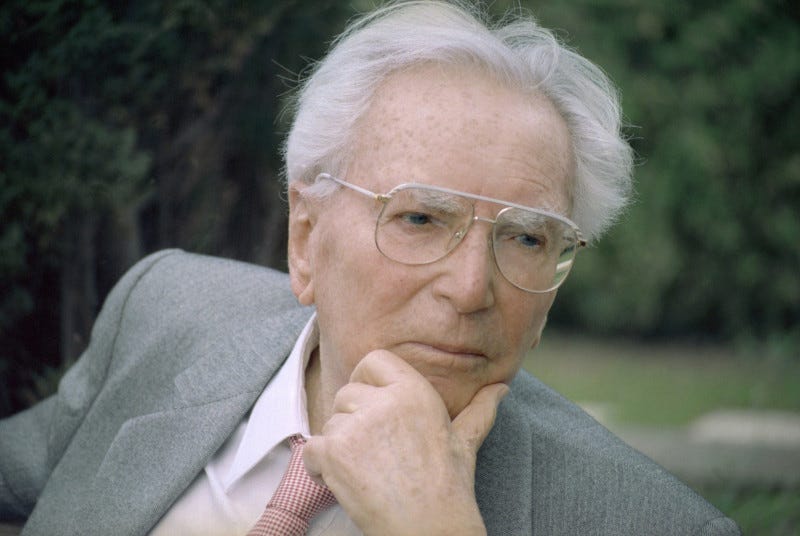Viktor Frankl – Against the Victim Cult
How a prominent psychologist from Vienna can help us combat the victim mentality
Viktor E. Frankl, Holocaust survivor and pioneering psychiatrist, withstood the darkest chapters of human history with a profound philosophy: meaning is found not in victimhood, but developing a mindset of purpose despite the hardship. While marking the 120th anniversary of his birth and the 80th anniversary of his liberation from Nazi concentration camps, Frankl’s enduring message of embracing individual agency stands as a powerful antidote to the growing culture of victimhood.
Between 1942 to 1945, the doctor and his family spent their lives in four Nazi death camps, including Auschwitz. His accounts of the death camps were written in a small volume, published in 1946 under the title A Psychologist Experiences the Concentration Camp. In the English-speaking world, the book is better known as Man’s Search for Meaning.
Within the brutal confines of Auschwitz, Dr. Frankl saw that “[t]he prisoner who had lost faith in the future—his future —was doomed. With his loss of belief in the future, he also lost his spiritual hold; he let himself decline and became subject to mental and physical decay.” The solution, Frankl posited, was a radical change in our attitude towards life: “We needed to stop asking about the meaning of life, and instead to think of ourselves as those who were being questioned by life—daily and hourly.”
In other words, finding meaning in life consists of taking responsibility for the individual’s daily actions, while persisting in the quest for answers to the deepest spiritual questions. It is little wonder why Frankl recommended that the Statue of Liberty be complimented by a Statue of Responsibility on the West Coast.
Despite its enduring status as a best-seller, the book’s philosophy has largely been ignored in the Western world. What emerged instead is an abandonment of individual agency, coupled with an idolatrous veneration of victimhood.
In his book The Victim Cult: How the culture of blame hurts everyone and wrecks civilizations, Aristotle Foundation President Mark Milke shows that the victim cult leads to a heightened culture of blame. While acknowledging that Indigenous Canadians suffered grave injustices during their history, Milke argues that this culture of blame takes “a broad-brush approach to both aboriginal and ‘European’ culture, romanticizing the first and wholly condemning the second.”
An example he cited is the 2015 report made by the Truth and Reconciliation Commission of Canada, which was explicit in its language that Western civilization and those who represent it are wholly to blame for the historical injustices that Indigenous Canadians had to endure. As Milke observed, the report mentioned “Europeans” 65 times; “white” 86 times; “culture” or “cultural” on 403 occasions; “education” (in the context of past harm or the need to re-educate Canadians) 498 times; “church,” “churches” or “Christianity” were mentioned 633 instances; and references to “genocide” were made 31 times.
Another example can be found in the 2019 report released by the National Inquiry into Missing and Murdered Indigenous Women and Girls. While it addresses a horrific tragedy involving the most marginalized population in Canadian society, it makes a grave error in propounding myths that sanctify Indigenous culture and vilify Western culture. According to Milke, the national report painted a romanticized view of Indigenous culture as “pure, ever-peaceful, and harmonious with the environment” while blaming the notion of two genders and the advances of modern science as “merely a result of ‘colonization and Christianity.”
But this runs against Viktor Frankl’s philosophy, which denounces collective guilt: “Guilt can in any case only be personal guilt—the guilt for something I myself have done—or may have failed to do! But I cannot be guilty of something that other people have done, even if it is my parents or grandparents.” The antidote to the victim cult, the doctor noted, is to slowly guide men and women back to the common truth that “no one has the right to do wrong, not even if wrong has been done to them.”
If a man who had the most legitimate claim to victimhood said these words, it is possible for all of us to renounce the victim cult in all its forms. As Milke stated, the belief that individuals should be treated as individuals with their unique sets of desires, faults, and gifts is a major contribution to peace and prosperity enjoyed across peoples, nations, and cultures today. The victim cult, on the other hand, inevitably leads a culture to the “muck of old injuries and renewed tribal thinking,” as well as a pervasive “nihilism that traps all who are near it, the innocent included.”





Thank you. Life with meaning! Good one!